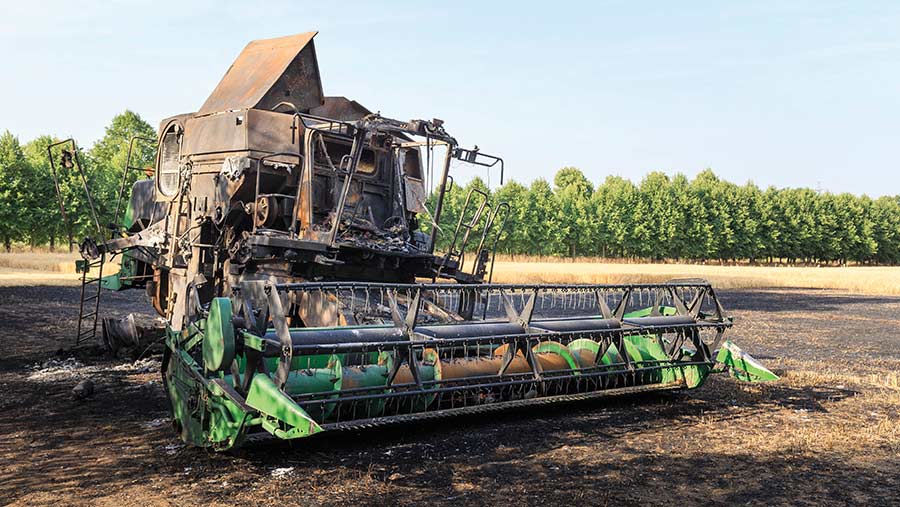Business Clinic: Following fire prevention tips will pay off
 © Tim Scrivener
© Tim Scrivener Whether it’s a legal, tax, insurance, management or land issue, Farmers Weekly’s Business Clinic experts can help.
Will Oakes, account executive at A-Plan Rural Insurance, lists some essential measures farms should take to guard against fire.
See also: Business Clinic: Why might there be a problem with our insurance claim?
Q: We had a combine electrical fault last year, leading to a fire and considerable damage to machinery, buildings and crops. The claim was eventually settled to our satisfaction, but what do you advise to prevent this and other fires from happening, and the potential premium increase?
A: Isolated locations, together with lots of machinery and combustible materials, put farms at high risk of fires that can quickly spread and become hard to control, especially in summer.
Electrical faults and farm arson attacks are often to blame, and combine fires are all too common.
The results can be devastating, causing widespread and expensive damage, business disruption and a great deal of stress.
Thankfully, many fires can be prevented by carrying out standard, regular maintenance. Here are 10 ways all farmers can reduce the risks.
- Carry out a fire risk assessment: this is required by law to help identify risks and plan how to reduce them.
- Prepare your yard. Keep it clean, make sure fire hydrants are serviced and working, put in place a plan to prevent fire spreading into your holding.
- Keep flammable materials such as fertiliser, straw and grain separate. Store straw and hay in small stacks and remove them as soon as possible to reduce the arson risk.
- Improve security to deter arsonists. Keep gates locked, use CCTV and ensure all fuels are stored securely.
- Inspect, clean and service machinery before using it. Don’t leave machinery unattended near flammable materials and keep all electrical inspections up to date. Clean out combines and grain dryers regularly; use an air compressor to blow away debris.
- Prepare farm workers. Ensure they know what to do in the event of a fire, for example knowing how to move any livestock, and where to. Tell them to keep mobile phones charged and with them at all times.
- Don’t forget visitors to the farm. If you have the public on your farm – for example as holiday guests – brief them on fire safety and make them aware of risks.
- Keep workshops clear. Remove waste, oily rags and other combustibles. If you carry out hot works, such as welding and grinding, ensure they take place away from combustibles.
- Keep a water supply nearby. If you have bowsers, ensure that they are close by and full of water.
- Prepare to stop a fire spreading. If you can, keep a tractor ready with a plough or harrow attached so you can create a firebreak quickly. Also, check firefighting equipment such as extinguishers is serviced and operational, or replaced if necessary.
However busy you are, never be complacent about fire risks. Taking the steps above can really make a difference.
No matter how well prepared you may be, there always remains a risk, so ensure the right cover is in place for buildings, crops and the increased costs of working in the event of a fire.
Do you have a question for the panel?
Outline your legal, tax, finance, insurance or farm management question in no more than 350 words and Farmers Weekly will put it to a member of the panel. Please give as much information as possible.
Email your question to FW-Businessclinic@markallengroup.com using the subject line “Business Clinic”.
